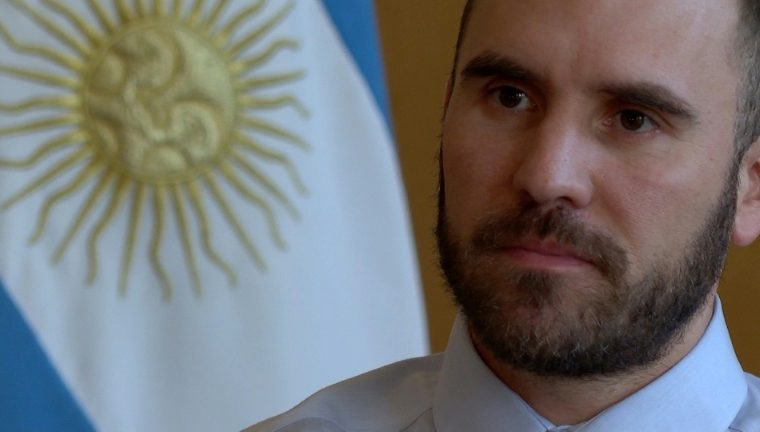
Argentine Economy Minister Martin Guzmán – AFP / Archives
The International Monetary Fund (IMF) could lose legitimacy if it “pushes Argentina into an unstable position” – Economy Minister Martin Guzmán warned in an interview with AFP, at a time when the country is on a new credit program with the organization. negotiating. ,
Argentina is seeking an agreement with the IMF that would allow it to extend the terms of the IMF’s payment of about US$44 billion since 2018, when it signed a loan of up to US$57 billion.
Of the total received, maturities are concentrated in 2022 and 2023, with US$19 billion and US$20 billion paid out, respectively. Guzman considers the program unstable.
After declining 9.9% in 2020, Argentina, Latin America, grew its gross domestic product (GDP) by 10% in 2021. But it is ravaged by poverty (40%) and 50% inflation, which is the highest. in the world.
The centre-left government of President Alberto Fernández wants to reach an agreement with the Fund on a program to reduce the fiscal deficit, but based on growth, not cutting public spending.
– Question: What are the prospects for Argentina for 2022? Is it possible that there will be no agreement with the IMF? Speaking of “default”: Are there any concerns?
– Answer: Argentina has a very high trade surplus, which is at the highest level we have reached. This was over US$15 billion in 2021. Argentina facing balance of payments problem in 2022? This is precisely the loan with the IMF. It is the debt with the IMF that creates the problem of balance of payments. And so it’s important to be able to refinance it. This is important for the country and also for the IMF.
If the IMF pushes Argentina into a destabilizing position, it will also lose legitimacy in the future, when other countries resort to multilateralism to solve their problems together with the international community.
If we are to defend each other and protect the functioning of multilateralism, it is important to agree on something credible. And reliable means implementable.
We have a set of economic and social objectives and of course, we want to fulfill our commitments, but we need time. We should be able to refinance those loans.
– Question: Do you expect a gesture from the United States as the largest shareholder of the IMF? How do you think a group of Democratic lawmakers have called for an end to surcharges for the countries with the biggest debt?
– A: This request from the US Treasury Secretary (Janet Yellen) was key to supporting a review of this policy on the IMF board, which harms countries in crisis called “extraordinary access to the International Monetary Fund”. Because they are charged more when the situation is bad. It does not (…) help fulfill the Fund’s mission of ensuring global financial stability. Countries with these interest rates lose the resources to make the investments needed to improve their ability to pay.
– Question: What is the disagreement on the tax issue?
There is practically agreement on where to converge, what is the primary financial outcome (before loan interest payments). The difference is in speed, and it has to do with the fact that they are looking at different targets.
In 2021, with the economy growing by 10%, the primary fiscal deficit fell to 3.5 points of product (gross domestic). The fiscal deficit for 2021 was between 2.9 to 3% of GDP, the figure will be known on January 20. This is a very steep drop. There is a good financial consolidation going on.
What the IMF raised is that there should be rapid fiscal consolidation. But there are two problems: First, the way they have put it, it will hinder economic recovery in the short term. The second is that the point at which the focus will be on rapid fiscal consolidation will be on the slow expansion of investment in public infrastructure (…). For us, this is fundamental, because this investment is what Argentina needs most, from a productive perspective. There is tension.
– Question: A few days ago you mentioned the dilemma between a perfect deal or an acceptable deal. Do you feel that close?
– A: There is no such thing as a perfect agreement. When there is a situation in which there is some interaction, it is because there is an inconsistency, and is defined by how the load is distributed. What we want is to take a step forward instead of taking a step back.
I’d say we’re a little better than we were a week ago, but there’s an important way to go. The frequency (of contacts with the IMF) is not only daily, but several times a day.
know more
+ SP: Man dies after leaning in front of car, and scene scares residents on shore
+ One twin became a vegetarian, the other ate meat. check result
+ Reincarnation in history: a centuries-old belief
+ Andressa Urach asks for money on the Internet: ‘Help me pay my card bill’
+ Horoscope: See today’s forecast for your zodiac sign
+ CNH: See what you need to know to apply and renew
+ See which were the most stolen cars in SP in 2021
+ Campaign identifies giant squid responsible for shipwreck in 2011
+ Everything You Need to Know Before Buying a Crockpot
+ US agency warns: never wash raw chicken meat
+ What is known about fluorone?
+ Lemon squeeze trick created a craze on social media
+ IPVA 2022 SP: See how to consult and pay tax



